It’s possible that I shall make an ass of myself. But in that case one can always get out of it with a little dialectic. I have, of course, so worded my proposition as to be right either way (K.Marx, Letter to F.Engels on the Indian Mutiny)
Monday, March 27, 2023
AUDREY McAVOY
Fri, March 24, 2023
HONOLULU (AP) — The chair of a parade honoring a Native Hawaiian leader and prince said Friday a state lawmaker won’t be allowed to participate in the event after he questioned a middle school principal’s display of a pride flag supporting LGBTQ+ people.
Kūhiō Lewis, the chairperson of the Prince Kūhiō Parade, said he notified Republican state Rep. Elijah Pierick of the decision in a letter.
“The LGBTQ+ and mahu community is an essential part of the fabric of Hawaii that we all know and cherish,” Lewis said in a statement. In Hawaiian language and culture, “mahu” refers to someone with dual male and female spirit and a mixture of gender traits.
The parade is scheduled to be held in Kapolei on Saturday. Lewis is also the CEO of the Council for Native Hawaiian Advancement, which is organizing and financially supporting the parade.
"Rep. Pierick’s commentary is hurtful, not aligned to the cultural values that we work to promote, and will serve as a distraction to honoring a true leader of Hawaii, Prince Kūhiō," Lewis said.
He said Pierick will be removed from the parade lineup. Lewis said he looked forward to educating Pierick on the significance of mahu and LGBTQ+ culture in Hawaii.
Piereck responded, saying: “I appreciate the perspective of the private entity that leads the parade and I honor their decision in who they invite to be in the parade.”
Lewis' statement comes after Pierick posted a video on Instagram relaying how he visited Ewa Makai Middle School and saw what he called “a LGBTQ flag” outside of the principal's office and other offices in the school.
“You might be thinking yourself, What does that flag actually represent? What is it conveying to our middle school students? This is what it means: lesbian, gay, bisexual, transgender, queer, questioning, intersex, asexual, plus,” he said.
“Are these the kinds of concepts and lifestyles we want to be conveying to our middle school students? Every Monday, Tuesday, Wednesday, Thursday and Friday all year round?,” he said.
He urged people with thoughts or concerns to contact the school principal, and he posted the school's phone number and her work email address.
“I believe my constituents have the right to know what’s going on in the school. What kind of symbols are being promoted and what kind of messages are being conveyed to the students?” Pierick said.
Piereck is a first-term legislator representing Kunia and Honouliuli. His district doesn't include the school but is nearby.
State Sen. Kurt Fevella, a Republican whose Ewa Beach district includes the school, posted a video on Facebook asking Pierick to apologize. He urged people to vote Pierick out when he is up for re-election in two years.
Fevella said teenagers contemplate suicide, drugs and alcohol abuse because they don't feel safe at school, at home and in their communities. He said they need to feel safe.
“We are losing our children, Facebook fam, because we get people like that. We get people like that judging our community,” Fevella said.
Pierick said he appreciated Fevella's thoughts and perspectives.
“He stands on the foundation of the First Amendment of freedom of speech. So I want to advocate his ability to speak freely. I encourage the community of Ewa Beach to watch original video, and make the conclusion for themselves of what they think the message is conveying,” Pierick said.
The Prince Kūhiō Parade honors Prince Jonah Kūhiō Kalanianaʻole, who was born in 1871.
He went into exile after the U.S.-backed overthrow of the Hawaiian monarchy in 1893. But he returned years later and in 1902 became a non-voting delegate to the U.S. House of Representatives in Congress, where he served for two decades.
He is credited with spearheading a law setting aside 200,000 acres of land to create homelands for Native Hawaiians.
March 26 is a state holiday in his honor, which will be observed on Monday.
Story by The Canadian Press • Tuesday
OTTAWA — As some private landowners restrict residential school survivors from performing ceremony or searching their properties for possible unmarked graves, a federal minister says Ottawa is open to legislating new protections for the possible burial sites.

Adviser on unmarked graves says some landowners are refusing access for searches© Provided by The Canadian Press
Kimberly Murray, who was appointed by Prime Minister Justin Trudeau's governmentto provide it with advice on how to handle such sites, testified before the Senate on Tuesday about her role and the main concerns she says she has heard from Indigenous communities.
"We need access to land," Murray told senators at a committee hearing. "This is what keeps me awake many nights, thinking about how some things could escalate."
She said there is currently no federal law in place to protect suspected gravesites or grant communities access to land that is privately owned but is believed to be home to unmarked graves.
When residential schools were closed, Murray said, the lands they were located on were not turned back over to First Nations or other Indigenous communities — "the rightful landholders," as Murray put it.
Speaking a separate event, Crown-Indigenous Relations Minister Marc Miller told reporters that many former sites are located on provincial Crown land, and there is "an immense amount of complexity" around who controls such areas.
While some landowners have shown "good faith" in their willingness to help communities, others have not wanted to give up their property or have increased the purchase price when it comes to surrendering their lands, he said.
"There are potential conflict points."
Miller said the government is open to legislating protections of such sites and is awaiting advice from Murray's office.
The final report from the Truth and Reconciliation Commission of Canada, which spent more than five years investigating the residential school system, says that more than 150,000 First Nations, Métis and Inuit children were forced to attended the government-funded church-run institutions.
It estimated that more than 6,000 children died at these facilities. The National Centre for Truth and Reconciliation, which archives testimony and other records from that period, maintains a student memorial register that includes more than 4,000 recorded names. However, many experts believe the number to be much higher.
Murray said Tuesday that some landowners have refused to provide access to their properties "even to do ceremony, let alone to search the grounds," adding that her office has had to write letters and meet with landowners to try and convince them otherwise.
"We have landowners that have campers on top of the burials of children, known burials," Murray said. "We don't have any law to put a stop to this."
In her testimony, Murray did not elaborate on specifics, but told senators such lands ought to be protected.
She said that while provinces have various laws that protect lands for different reasons, these are often not enforced and are unlikely to provide cohesive protection for unmarked graves.
"We have a big gap federally in the legislation."
Murray said the only recourse a survivor or community currently has is to go to court.
She pointed to a recent case in Quebec, where a judge granted an injunction after a group of elders known as Mohawk Mothers said the bodies of Indigenous patients of the Allan Memorial Institute and the Royal Victoria Hospital were buried at a site McGill University had slated for redevelopment.
The judge granted Murray intervener status in the case and ultimately ruled that the parties needed to discuss a plan to search the site for graves.
"Do we have to go to court to get injunctions to stop development on lands where there are burials?" Murray asked senators Tuesday.
"There's got to be a better way."
Murray was appointed to her role last June, fulfilling a promise made by Prime Minister Justin Trudeau's government that it would seek independent advice on how to help Indigenous communities that want to search for unmarked graves.
First Nations from across Western Canada and in parts of Ontario have been conducting such searches. In May 2021, the Tk'emlúps te Secwépemc Nation announced it had detected 215 possible unmarked graves at a former residential school in Kamloops, B.C.
That number sent waves of shock, grief and anger rippling through the country and saw Indigenous and non-Indigenous communities renew calls for federal and church authorities responsible for the system to be held accountable.
But nearly two years later, Murray said many Indigenous communities are still battling denialism.
"Every time an announcement of anomalies or reflections or recoveries are made, communities are being inundated by people emailing them and phoning them and attacking them and saying, 'This didn't happen,'" she told senators.
"I sit here and tell you: this happened. I have seen the records. I have seen the photographs of children in coffins. We need to all fight this denialism and it shouldn't be left to the survivors to have to do that."
This report by The Canadian Press was first published March 21, 2023.
Stephanie Taylor, The Canadian Press

Headstones are seen at the cemetery of the U.S. Army's Carlisle Barracks, Friday, June 10, 2022, in Carlisle, Pa. A Native American tribe in South Dakota is pressing federal authorities to return to them the remains of a 13-year-old boy who died soon after arriving at a federal boarding school for indigenous children in November 1879. The Sisseton Wahpeton Oyate wrote to the head of the U.S. Army's cemetery office this week, Friday, March 24, 2023, demanding movement on their effort to have the remains of Amos LaFromboise repatriated from a graveyard at the Carlisle Barracks.
MARK SCOLFORO
Fri, March 24, 2023
Federal authorities expect to return a 13-year-old boy's remains to his Native American tribe in South Dakota this fall, they said Friday. The statement comes days after the tribe urged for a faster return of the child who died at a federal boarding school for Indigenous children in 1879.
The Sisseton Wahpeton Oyate wrote to the head of the U.S. Army's cemetery office this week, demanding movement on their effort to have the remains of Amos LaFromboise repatriated from a graveyard at the Carlisle Barracks, a military facility in Pennsylvania.
The letter from three lawyers with the Native American Rights Fund to Army Cemeteries Executive Director Karen Durham-Aguilera describes the child as the son of one of the tribe's most celebrated leaders, Chief Joseph LaFromboise, who signed an 1867 treaty that established their current reservation boundaries.
The Office of Army Cemeteries emailed a statement saying that Amos LaFromboise's disinterment was approved a year ago and that the Army also told the boy's family and the tribe's chair last summer that his remains will be returned in 2023. His disinterment will be entirely at the Army’s expense, the office said.
“The Army currently plans to conduct the disinterment of Amos this September and the required Federal Register Notice will be published in the next 60 days,” according to the statement.
The tribe argues that the Army has been requiring repatriation standards that are more demanding than those in the federal Native American Graves Protection and Repatriation Act, mandating a signed affidavit from the child’s closest living relative, which can be difficult or impossible for 19th century remains.
“Sisseton Wahpeton Oyate expected Amos to return home from Carlisle Indian Industrial School,” they wrote, “to lead his people like his father and serve as a model for future generations of Tribal leaders.”
Lawyers for the tribe said Friday their request stands to have Amos LaFromboise repatriated under the Native American Graves Protection and Repatriation Act and that the tribe is willing to discuss the next steps.
Amos LaFromboise died 20 days after his arrival at Carlisle the year the school opened. The tribe's letter says the Army has previously dug up and reburied his remains at least three times in three different locations. The Sisseton Wahpeton Oyate want to bury him next to his father on the Lake Traverse Reservation in northeast South Dakota.
Tribe historians say six children of tribal leaders were sent to Carlisle in 1879. Three of the boys died there and a fourth passed away shortly after he returned home.
At a ceremony two years ago to return nine disinterred remains of Rosebud Sioux children, U.S. Interior Secretary Deb Haaland said forced assimilation practices at Indian schools stripped away the children's clothing, language and culture.
The Carlisle school put children through harsh conditions that sometimes resulted in their deaths. Founded by an Army officer, the school cut their braids, dressed them in military-style uniforms and punished them for speaking their native languages. European names were forced upon them.
More than 10,000 Native American children were taught there and endured harsh conditions that sometimes led to death from such diseases as tuberculosis. There have been several rounds of disinterment and repatriation at Carlisle in recent years.
Right-Wing Commentator Trashes GVSU’s Celebration for Native American Students
835
Levi Rickert
Sun, March 26, 2023

Previous Native American graduation feast to celebrate their success. (Photo/Grand Valley State University)
Opinion.
On Monday, Grand Valley State University (GVSU) was ridiculed on Twitter by right-wing commentator Matt Walsh about an email sent by university officials announcing graduation celebrations for five groups that include Asian, Black, LGBT, Hispanic, and Native American graduates.
I have for the past 15 years served on the university’s Native American Advisory Council. Based in Allendale, Michigan on ancestral Potawatomi land, GVSU has a student body of just under 22,000 students according to the university’s diversity dashboard.
The celebrations are being held in addition to the spring unified commencement.
Walsh trashed the graduation celebrations as being “ridiculous.” He whined: "There will be no special celebrations for straight white people, of course."
As of Sunday morning, Walsh’s tweet had about 1.8 million views and triggered numerous responses that appeared to be about 10-1 in favor of his opinion — some calling Michigan “a liberal wasteland” or blaming GVSU for “(setting) back the civil rights movement 60 years.”
GVSU then got national attention when Newsweek ran a story on Tuesday with a headline — “College Segregating Graduation Ceremonies by Race Sparks Anger” — that some took to mean that the celebrations were separate commencement ceremonies. They are not. There is a unified commencement for all students.
Some folks I spoke with about the uproar thought that I should discount it as right-wing rhetoric and ignore it. That this just another day in the culture wars, where White conservatives were just pushing back on the progress of Native Americans, Hispanics, African Americans and Asian-Americans.
But, hold on. Here is where it hit close to home for me. On Wednesday, as a member of the Native American Advisory Council, I was forwarded an email that read: “F*#@ you and your divisive, political, woke a$$ views. Your POS so-called institution of ‘higher learning’ can go to hell!”
While I will admit I don’t fully understand the email author’s true intent beyond spewing some hate, I was alarmed nonetheless given recent events at another nearby university. GVSU’s main campus is an 80-mile drive from Michigan State University, where last month a person walked onto campus and killed three innocent students, while critically injuring five others.
We know there are unbalanced people in society who commit violence because they're angry. Reading that email made me wonder if this person or others would show up at commencement or any of the special celebrations next month with intent to do harm. Our advisory council would be remiss if we did not consider the possibility.
As an original member of the Native advisory council since its inception 15 years ago, I continue to serve on it — even with a tremendously busy schedule — because we are still working on our original goal to recruit, retain, and graduate Native Americans from GVSU.
That’s no mean feat when you look at national trends for Native American higher education attainment rates. According to the Postsecondary National Policy Institute, completion rates for Native American students are lower from all students overall, though there are signs of progress. The findings show that:
41% of first-time, full-time Native American students attending four-year institutions beginning in 2013 graduated within six years, compared to 63% for all students.
25% of Native Americans over the age of 25 had an associate degree or higher in 2019, compared with 42% of all those over the age of 25.
Between 2010 and 2019, the percentage of Native Americans over the age of 25 who had attained at least an associate degree increased from 21% to 25%.
The educational attainment gap is the result of many factors, including the fact that “Native American students are also less likely to have family members that have attended college,” according to PNPI.
Given this data, it is absolutely proper for Native American students who graduate to be celebrated. And anyone who knows anything about Native people knows that we are a people who prioritize community first and foremost. For these reasons, an annual graduation celebration has been held, in conjunction with the Native American Advisory Council and the university, for the past seven years.
We assist with the annual celebrations that are called feasts. Family and friends are invited to gather near the date of the unified commencement. It is a time to celebrate the accomplishments of Native graduates. Those who attend eat Native American cuisine, laugh, and even shed tears of joy — knowing they have overcome the odds that have worked against them and our people for centuries.
“These intimate celebrations allow for our community to celebrate together. With Native graduation rates the lowest in the nation, celebrating these amazing scholars and leaders not only honors them and their families, but our ancestors and our collective struggle for education,” said Simone Jonaitiss, Ph.D. (Little River Band of Ottawa Indians), executive director of GVSU’s Center for Adult and Continuing Studies and co-president of the Native American Advisory Council.
Lin Bardwell (Little Traverse Bands of Odawa Indians), who is an assistant director in GVSU’s Office of Multicultural Affairs, says the hateful email this year is not an isolated case. Every year, Bardwell says, the school receives phone calls and emails from students asking ‘where the White graduation is.’
The culture war is alarming to us who seek a better world for Native American students. But it won’t stop us. We will continue to celebrate their achievements.
Thayék gde nwéndëmen - We are all related.
About the Author: "Levi Rickert (Prairie Band Potawatomi Nation) is the founder, publisher and editor of Native News Online. Rickert was awarded Best Column 2021 Native Media Award for the print\/online category by the Native American Journalists Association. He serves on the advisory board of the Multicultural Media Correspondents Association. He can be reached at levi@nativenewsonline.net."
Contact: levi@nativenewsonline.net
Retirement funds for teachers and firefighters are caught in ESG crossfire
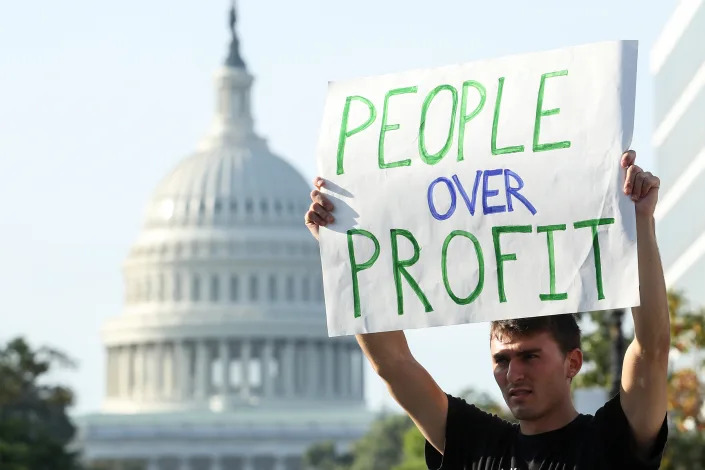
Nidhi Sharma
Sun, March 26, 2023
A growing wave of public pension administrators, business groups and labor unions are sending a message to Republicans looking to curb so-called “woke” investing: our money, our choice.
Regulatory efforts to stop money from going to funds that consider environmental, social and governance issues, commonly known as ESG investing, have typically targeted big Wall Street asset managers. Now, public pensions are increasingly caught in the crosshairs and with them the retirement funds of teachers, librarians, firefighters and other public service employees.
But while opponents of the anti-ESG restrictions are getting louder, their dissent hasn’t yet stopped the tide.
ESG investing — a market forecast to hit $33.9 trillion globally, or more than one-fifth of all assets under management, by 2026 — remains loosely defined, and some proponents have resisted regulatory efforts to tighten criteria around what qualifies for the label. Nevertheless, many conservatives have decried the practice as part of an activist liberal agenda and are pushing to limit it.
At least seven red states have implemented or are considering regulations banning public entities from considering ESG factors when investing state resources, according to a Harvard University report. Eight states have advanced bills or directives that target companies or banks accused of boycotting investments in oil and gas or firearms.
In Indiana, Texas and Kansas, Republicans have introduced bills that would prohibit ESG investing by state retirement systems, drawing fresh blowback from labor groups and others.
“These states talk about limited government, the free market, and now are using government regulations and legislation to actually curtail the responsibilities and the fiduciary obligations of retirement systems,” said Randi Weingarten, the president of the American Federation of Teachers, which boasts some 1.7 million members. “They are using the government to intrude upon and undermine the needs of retirees.”
Public pension assets in the United States total some $5.2 trillion, according to data from both the National Association of State Retirement Administrators and the Federal Reserve. Industry watchers say limited public information, among other factors, makes it difficult to estimate how much of those funds are invested in ESG-related products.
However, state and municipal pension funds have shown strong support for ESG investing, backing resolutions in favor of the practice about 90% of the time in 2021, compared with 63% among general shareholders, Morningstar researchers found last summer.
Whether ESG investments advance the goals under which they’re marketed has been debated for years. For example, some major asset managers with substantial pension holdings, such as BlackRock, continue to invest in fossil fuel companies while also advocating publicly on behalf of ESG investing.
That has drawn criticism from anti-ESG conservatives, as well as from its proponents who want tighter and more standardized criteria. In his annual letter to shareholders last week, BlackRock CEO Larry Fink omitted the term “ESG” altogether and treaded lightly around climate and energy policies, while acknowledging, “For years now, we have viewed climate risk as an investment risk. That’s still the case.”
“But as I have said consistently over many years now,” he wrote, “it is for governments to make policy and enact legislation, and not for companies, including asset managers, to be the environmental police.”
According to Lisa Sachs, director of the Columbia University Center on Sustainable Investment, ESG investing doesn’t automatically guarantee sustainability — and its critics tend to misrepresent the practice for political reasons.
“The anti-ESG movement is a political show because it’s creating an enemy when there isn’t one, in order to appear defensive of the fossil fuel industry,” she said.
This month in Texas — the center of the U.S. oil and gas industry — Republican state Sen. Bryan Hughes proposed adding pension funds to the list of entities already barred from considering social, political or ideological factors when making fiduciary decisions.
The state passed a law in 2021 requiring the comptroller to maintain a list of public companies and funds that have engaged in alleged boycotts of energy companies. It requires all state entities to divest from the listed financial institutions or funds, which include certain banks that underwrite municipal bonds.
Criteria for the list include scoring high on indicators that describe engagement from board members on climate risk. BlackRock is on the list, despite publicly emphasizing that it has invested $170 billion in U.S. public energy companies.
BlackRock referred a request for comment to Fink’s letter.
As Sachs sees it, the energy transition is underway with or without ESG investing, and legislators who blacklist businesses involved in the practice are only hurting their own economies. She said that limiting the pool of investment options available to pension funds can increase the costs and lower the returns for retirees.
“It’s the firefighters and the municipal workers who are really going to see the financial impact on their pension funds, as a result of constraints on financial institutions and options,” she said.
Rick Levy, president of the Texas AFL-CIO labor union, said legislators are playing politics with working people’s money. “It’s extremely upsetting that state leaders are taking aim at investment companies trying to maximize returns for their shareholders — by turning it into a political event that negatively impacts our pensions.”
The partisan rhetoric may be overstating the policy impacts. As researchers at S&P Global Market Intelligence wrote in October, many states that banned retirement funds from ESG investments hadn’t yet implemented those rules, limiting the practical impact on fund managers’ activities.
Still, several state research agencies have flagged potentially substantial costs to pensioners from the proposed restrictions on ESG investing.
In late February, the Republican-led Indiana House approved a bill that would require the Indiana Public Retirement System and the Indiana State Police Pension Trust to divest from any ESG funds and cease business with offending companies.
Weeks earlier, the Indiana Legislative Services Agency, a nonpartisan government office, had published an analysis concluding ththe bill could cut investment returns for retirees by $6.7 billion over the next decade, a finding that fueled opposition to the legislation.
The Indiana Chamber of Commerce, a business group that has long maintained friendly ties with Republican lawmakers, came out against the measure. “We’ll continue to voice our strong opposition to House members as well as key senators,” the group tweeted after the cost analysis was released.
Indiana Chamber CEO Kevin Brinegar said he has heard concerns from several members, many of whom are in the banking industry. He added that the chamber has always believed markets should function with minimal government interference.
State Rep. Ed DeLaney, a Democrat who opposes the legislation, described ESG investing as a critical tool for weighing the full set of potential risks to the performance of certain assets.
“The fundamental proposition is that our pension should not be invested in the most productive way, to get the best return at the lowest risk — but instead should be invested in a way to protect certain favored industries,” he said.
A spokesperson from the Indiana Public Retirement System said it doesn’t consider ESG factors in its investment decisions, adding that “INPRS has and will continue to engage with the Indiana General Assembly on any financial impacts created by HB 1008 and work toward a solution.”
Indiana’s bill echoes similar legislation in Kansas, where GOP state senators recently proposed the Kansas Protection of Pensions and Businesses Against Ideological Interference Act. A state-issued impact statement found that the measure could cost the Kansas Public Employees Retirement System as much as $3.6 billion in returns over the next 10 years. The state retirement system has pushed back against it.
And in Kentucky, a law passed last year that requires the state treasurer to maintain a list of companies that allegedly boycott energy companies drew pushback from the Kentucky County Employees Retirement System. In February, the group stated that it would not divest as instructed from ESG holdings, including BlackRock, citing its fiduciary duties to retirees.
Not all state pension funds have been fighting for the right to apply ESG principles. Vermont’s pension commission has raised concerns about Democratic efforts to compel the state’s roughly $6 billion in pension assets to divest from fossil fuels — a category that has seen strong returns after the war in Ukraine drove up energy costs last year.
The ESG battle has been bubbling up in Washington, too. On Thursday, the House failed to override President Joe Biden’s first veto, in which he blocked a bipartisan bill that would have nullified Labor Department rules permitting some retirement plans to consider ESG factors.
This article was originally published on NBCNews.com
Sun, March 26, 2023

Transport staff across Germany are set to stage a major strike on Monday to push for wage hikes in the face of brisk inflation, as passengers brace for serious disruptions.
Workers at airports, ports, railways, buses and metro lines throughout much of Europe's top economy are expected to heed a call by the Verdi and EVG unions to the 24-hour walkout.
"A labour struggle that has no impact is toothless," Verdi chief Frank Werneke told public broadcaster Phoenix.
He acknowledged that it would inflict pain on many commuters and holidaymakers, "but better one day of strain with the prospect of reaching a wage agreement than weeks of industrial action".
To prevent supply gaps, Transport Minister Volker Wissing has ordered states to lift restrictions on truck deliveries Sunday, while asking airports to allow late-night takeoffs and landings "so stranded passengers can reach their destinations".
Verdi represents around 2.5 million public sector employees, while EVG represents 230,000 workers on the railways and at bus companies.
The rare joint call for a strike in Germany marks an escalation of an increasingly ill-tempered dispute over a pay packet to blunt the impact of surging inflation.
Employers, mostly the state and public sector companies, have so far refused the demands, instead offering a rise of five percent with two one-off payments of 1,000 ($1,100) and 1,500 euros, this year and next.
Verdi is demanding a rise of 10.5 percent in monthly salaries, while EVG is seeking a 12-percent rise for those it represents.
- 'Massive impact' -
State-owned rail company Deutsche Bahn (DB) has completely suspended all long-distance trains for the day and many regional and local connections will be at a standstill.
DB's Martin Seiler, responsible for human resources on the company's management board, described the nationwide strike as "groundless and unnecessary" and urged the unions to return to the negotiating table "immediately".
The company expects the walkout to have a "massive impact" on its entire rail network and has pledged to inform its customers "as quickly and comprehensively as possible" about cancellations and delays.
The German airport association, which estimated about 380,000 air travellers would be affected, said the walkout "went beyond any imaginable and justifiable measure".
Employers have accused labour representatives of contributing to a wage-price spiral that will only feed inflation, while unions say their members have been asked to bear the burden of the soaring cost of living.
"Petrol and food prices have risen, I'm feeling it in my wallet," Timo Stau, 21, told AFP at a protest on Thursday in Berlin.
- 'Economic hardship' -
Like in many other countries, Germans are struggling with high inflation -- it hit 8.7 percent in February -- after Russia's invasion of Ukraine sent food and energy costs soaring.
The "mega-strike", as local media have dubbed it, follows industrial action in recent months in several German sectors, from the postal service to airports and local transport.
A third round of salary negotiations for public-sector workers is due to begin on Monday.
Earlier in March, Bremen, Berlin, Hamburg and Hanover airports cancelled more than 350 flights after security staff walked out. Bus and metro staff in Frankfurt also staged a strike.
Some unions however have succeeded in winning big pay increases.
Postal workers won average monthly increases of 11.5 percent earlier in March, and in November IG Metall, Germany's biggest union, won hikes totalling 8.5 percent for almost four million employees that it represents.
Although Monday's walkout is set to create travel chaos, it pales in comparison to the industrial disputes rocking neighbouring France, where President Emmanuel Macron's pension reform plans have ignited voter anger.
Rubbish is gathering in the streets of Paris due to a rolling strike by garbage collectors, while blockades of oil refineries by striking workers are beginning to create fuel shortages around the country.
bur-dlc/hmn/jj/lb
Sun, March 26, 2023
By Klaus Lauer and Tom Sims
BERLIN/FRANKFURT, March 27 (Reuters) - A massive strike in Germany was set to begin early Monday, crippling mass transport and airports in one of the biggest walkouts in decades as Europe's largest economy reels from soaring inflation.
In the hours running up to the strike, both sides dug in their heels, with union bosses warning that considerable pay hikes were a "matter of survival" for thousands of workers and management calling demands and the resulting action "completely excessive".
The strikes, which were scheduled to mainly start just after midnight and affect services throughout Monday, are the latest in months of industrial action that has hit major European economies as higher food and energy prices dent living standards.
Germany, which was heavily dependent on Russia for gas before the war in Ukraine, has been particularly hard hit by higher inflation as it scrambled for new energy sources, with inflation rates exceeding the euro-area average in recent months.
German consumer prices rose more than anticipated in February - up 9.3% from a year earlier - pointing to no let-up in stubborn cost pressures that the European Central Bank has been trying to tame with a series of interest-rate increases.
It has been a painful adjustment for millions of workers throughout the country as costs of everything from butter to rents rise after years of fairly stable prices.
"It is a matter of survival for many thousands of employees to get a considerable pay rise," Frank Werneke, head of the Verdi labour union, told Bild am Sonntag.
France has also faced a series of strikes and protests since January as anger mounts over the government's attempt to raise the state pension age by two years to 64.
But officials in Germany have made clear that their fight is only about pay.
The Verdi union is negotiating on behalf of around 2.5 million employees in the public sector, including in public transport and at airports. Railway and transport union EVG negotiates for around 230,000 employees at railway operator Deutsche Bahn and bus companies.
Verdi is demanding a 10.5% wage increase, which would see pay rising by at least 500 euros ($538) per month, while EVG is asking for a 12% raise or at least 650 euros per month.
Deutsche Bahn on Sunday said the strike was "completely excessive, groundless and unnecessary".
Employers are also warning that higher wages for transport workers would result in higher fares and taxes to make up the difference.
($1 = 0.9295 euros) (Reporting by Tom Sims and Klaus Lauer; Editing by David Holmes)
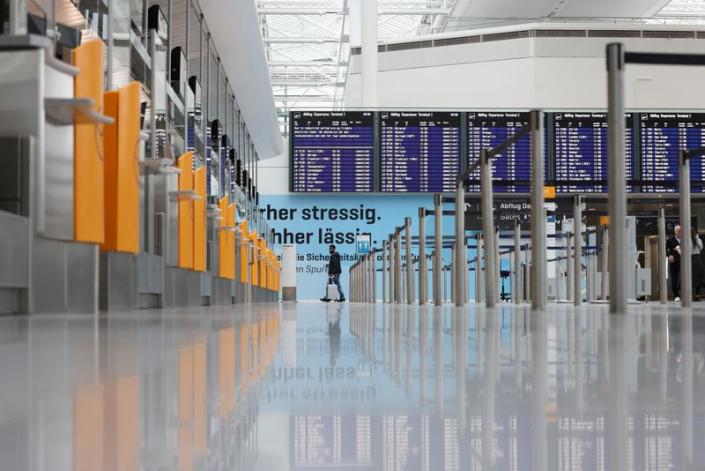



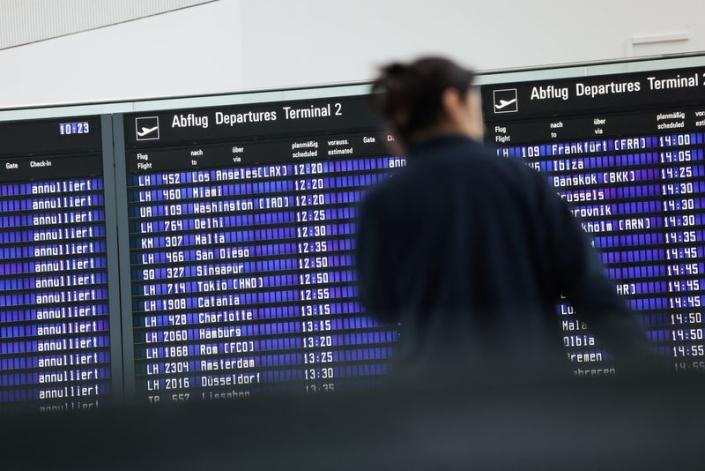
German workers' strike over pay is matter of survival, union boss tells Bild
Sunday, March 26, 2023
Toby Helm, Political Editor
Sun, 26 March 2023
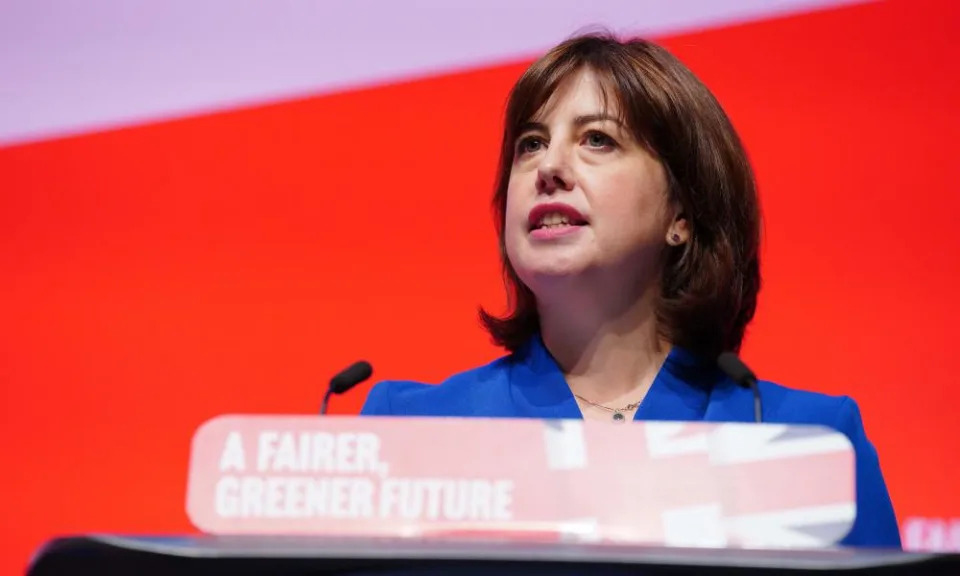
Photograph: Peter Byrne/PA
A root and branch review of the BBC’s operations – including how its chairman and board are appointed – was announced on Sunday by Labour amid growing doubts about the corporation’s political independence under the Tories, and its future as a public service broadcaster.
The move follows bruising rows over Gary Lineker’s suspension from Match of the Day for criticising language used by ministers to describe immigration policy, and the appointment by former prime minister Boris Johnson of Conservative donor and supporter Richard Sharp as the BBC’s chairman.
In recent weeks there have also been reports of the BBC having come under pressure from the government to change its coverage of Brexit and the Covid-19 pandemic for political reasons.
Labour’s BBC review panel, made up of leading media and business figures, will meet for the first time this week. It is being set up by Lucy Powell, the shadow culture secretary, who said the appointment of Sharp after he had helped Johnson secure an £800,000 loan, epitomised the lack of transparency and “revolving door” culture between government and corporation that had damaged the BBC’s reputation.
“The whole appointment of Sharp stank,” she said. “We need to cherish the BBC as a great national institution at the heart of British life and that involves looking at how we secure its reputation for independence from government and its place in a rapidly changing global media landscape.”
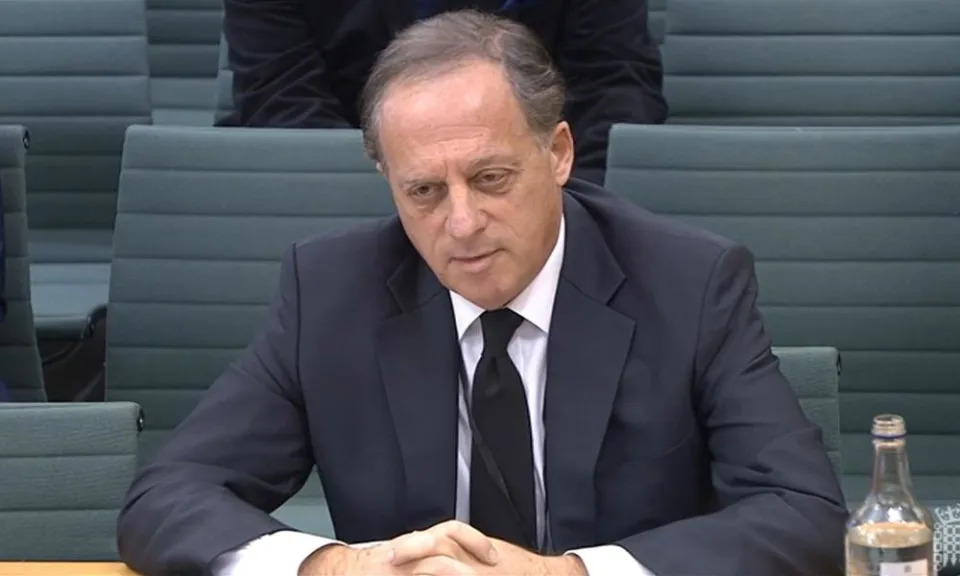
BBC chairman Richard Sharp is questioned by MPs about how he helped Boris Johnson secure a loan. Photograph: House of Commons/PA
She added: “There are serious headwinds. The media climate is changing, with competition from online streaming giants, the switch to digital over linear TV, rising costs and stalled progress on prominence. The BBC consistently finds itself at the centre of culture wars and questions over its impartiality and independence. Continuing the status quo is not an option.”
While Rishi Sunak’s government has toned down the hostile attitude adopted by Boris Johnson’s culture secretary, Nadine Dorries, who seemed intent on scrapping the licence fee altogether, many Tories still see the corporation as having an ingrained leftwing bias that needs to be erased by radical reform. Labour, by contrast, wants to position itself as a supporter of the best traditions of the BBC and its role at home and overseas, while also being open to change, including about the precise form the licence fee should take.
The Labour panel includes TV producer Steve Morrison, a former Granada TV director of programmes and chief executive who has had roles in the BBC; James Purnell, a former BBC director of strategy and culture secretary under Labour; TV presenter June Sarpong, who was formerly the BBC’s first director of creative diversity, and Lou Cordwell, chair of the Greater Manchester Local Enterprise Partnership, who worked with the BBC on a range of high-profile digital projects.
Labour’s move to highlight the importance of the BBC to the country and its image abroad reflects its determination to stress patriotic themes in the run-up to the next general election. It is also keen to play up the growing impression of Tory influence over the BBC before an election in which it fears an onslaught by rightwing sections of the media, such as the Daily Mail and Daily Telegraph, and will need to rely on the BBC for impartiality.
The panel’s terms of reference will include how to prepare for the BBC’s next charter renewal in 2027; future funding, including the licence fee and what services the BBC would provide from it; independence and impartiality; and how the BBC can compete and thrive in the digital age.
Related: Stop kicking the BBC on bias. A right turn was needed, but now it’s gone too far | Roger Harrabin
Labour has been planning the review for months as major decisions on funding and the charter approach. But the BBC’s role has come into the political spotlight following explosive claims last year by the former presenter Emily Maitlis that a Tory “agent” was “acting as the arbiter of BBC impartiality” from his seat on the corporation’s board. Although Maitlis did not name him, she was referring to Theresa May’s former director of communications, Robbie Gibb, who has denied the claims. Gibb is one of four BBC board members whose posts are in the gift of the government.
Sharp is now the subject of two separate investigations. The appointment is being probed by an “independent person” after William Shawcross, the commissioner for public appointments, recused himself for having met Sharp previously, and the BBC itself is investigating whether there has been any breach of its conflict of interest rules since he joined the corporation.
Last month the Commons digital, culture, media and sport committee criticised Sharp for omitting details about his involvement in connecting the Cabinet Office with a businessman interested in offering Johnson financial assistance when he was applying for the post of BBC chairman. It said such omissions “constitute a breach of the standards expected of individuals” applying for prominent public appointments. A spokesman for Sharp expressed regret that he had not made information available to the MPs who vetted his appointment.
Labour says it is committed to retaining the BBC as a universal, publicly owned, publicly funded public service broadcaster.
A BBC spokesperson said: “The BBC plays an important part in national life and we look forward to engaging with the review.”
• This article was amended on 26 March 2023 to add a statement from the BBC received after publication.
Michael Savage
Sun, 26 March 2023

Photograph: Alamy
Dissatisfaction at social care services among those who have had to deal with them has spiralled to “unbelievably distressing” levels, according to Britain’s most comprehensive study of the public’s experiences.
Two-thirds of people who have used or had contact with social care – for themselves or someone else – were dissatisfied, an analysis of the British Social Attitudes survey has revealed.
And among the public as a whole, only one in seven British people are satisfied with social care services, according to the survey, which is regarded as the gold standard for measuring public opinion.
The findings, revealed by leading health thinktanks the Nuffield Trust and the King’s Fund, show that unhappiness has been growing since 2018, and come against a background of continued complaints that the system is underfunded, that low pay makes it difficult to retain staff and that a promised cap on costs has been delayed until after the next election.
Andrew Dilnot, the economist behind the plan to cap social care costs, said the results were “something we should be ashamed of”, and that inaction was causing misery – for people delivering care and for the people who need it.
He told the Observer: “The reason British Social Attitudes survey numbers are so important is that they show how miserable we’re making the lives of people who need care and their families at a time when we should be looking after them. We’re just going to get more and more of that. It doesn’t have to be like this.
“Compared with our health service or our education system, the amounts of money involved in social care are small. We have somehow not managed to make it a big enough priority.”
Broken services, demoralised staff and the increasing strain on friends, family create a sobering reality
Laura Schlepper, researcher
The alarming care findings have been released ahead of the survey’s full health and care report later this week. According to the survey,, carried out by the National Centre for Social Research (NatCen) in September and October 2022, the main source of dissatisfaction is people not getting all the social care they need. Other issues cited were inadequate pay, working conditions and training for social care workers and lack of support for unpaid carers.
There were 165,000 unfilled vacancies in social care in England last year. Nuffield Trust researcher Laura Schlepper, the report’s author, said the results came after decades of neglect. She added: “Broken, complicated and fragmented services, demoralised staff in short supply and the increasing strain on friends, family and informal carers to pick up the pieces all create a sobering reality. These results are yet another reason for politicians to replace words with action on social care reform.”
Sally Warren, director of policy at the King’s Fund, said the results made the continued delays to reforming the system all the more frustrating. “We can expect dissatisfaction to rise further still if social care provision continues to decline, with people who draw on care and support, their carers and those working in the sector feeling the pain of this,” she said.
Professor Martin Green, chief executive of Care England, said the government “starves the social care sector of money, and individuals who have to pay for their own care are aggrieved because they feel it should be free at the point of need, exactly as the NHS is”. The Guardian revealed this week that a third of care homes across England have considered closing during the past year because of “financially crippling” running costs. Meanwhile, about £480m in public funds is estimated to have been spent on “inadequate” care homes in the last four years.
A Department of Health and Social Care spokesperson said: “We recognise the challenges faced by families who rely on social care – and those in the adult social care sector – which is why we are committed to working closely with providers to ensure people receive the highest-quality care. We are providing up to £7.5bn of additional funding over the next two years to support care services, the biggest increase in history. This will help local authorities address waiting lists and workforce pressures.
“We are working to reduce vacancies through a national recruitment campaign, and we have made care workers eligible for the Health and Care visa. We are also making available £15m investment in international recruitment.”
FRANCE 24
Sun, 26 March 2023

© Geoffroy Van der Hasselt, AFP
They ride in pairs, are armed with handguns, expandable batons and tear gas grenades, and have been specially trained to prevent protests from spiralling out of control. But since France’s pension protests began, officers belonging to France’s special Brav-M motorbike unit have increasingly been accused of taking the law into their own hands, intimidating and threatening people, and in some cases, resorting to the use of excessive force.
On Friday, four days after Paris was the scene of one of the most violent demonstrations in years as hundreds of thousands of people thronged the streets to protest the government’s pension reform, French daily Le Monde and online video broadcaster Loopsider published a troubling audio recording.
In the nearly 20-minute-long clip, police officers are heard humiliating and menacing a young man, who claims to be from Chad, telling him that if they see him on the streets again “you won’t be getting into a police van to go to the station, you will be getting into something else, called an ambulance, and go to hospital”.
Two slaps can also be heard in the audio.
Paris police chief Laurent Nuñez immediately condemned the incident, calling the behaviour both “unacceptable” and unethical, telling French broadcaster France 5 that: “Like everyone else, I’m very shocked.”
Matthew Norman
Sun, 26 March 2023

Andrew Finney of Fossil Free Oxfordshire on divestment day, at county hall.
Campaigners gathered outside county council offices calling for urgent funding to help tackle climate change.
Fossil Free Oxfordshire marked national divestment Day on Friday by calling on Oxfordshire Local Government Pension Fund to accelerate and broaden the changes it is making in its investments away from oil and gas.
They could be seen outside County Hall in Oxford on Friday (March 24) to call on the county’s pension fund committee to act more rapidly in divesting from climate-damaging investments.
They were joined by Oxford Friends of the Earth and Extinction Rebellion (XR) members to leaflet council employees and sing.
READ MORE: Cars parked illegally outside religious centre in Oxford
Fossil Free Oxfordshire member Andrew Finney said: “This week United Nations Secretary General, Antonio Guterres, said that we all have the tools we need to solve climate change challenges.
"We just have to deploy them, everything, everywhere, all at once.

Jo Gill from XR joined Fossil Free Oxfordshire outside County Hall. Credit: Zoe Broughton (Image: Zoe Broughton)
“Organisations like the Oxfordshire Local Government Pension Fund, and the larger Brunel Partnership that it’s part of, have the financial levers that can make those changes actually happen.”
In November 2019, the Oxfordshire Pension Fund Committee held a workshop about climate change and investment and heard from experts in climate-friendly investment, representatives from the Brunel Pension Partnership and from climate-concerned NGOs such as Carbon Tracker.
Pension scheme member Pete Wallis said: “After the climate change workshop held in 2019, the councillors on the Pension Fund Committee do seem to have listened to lobbying by Fossil Free Oxfordshire.

"And also from scheme members like me, who don’t want our pensions to be supporting climate-destroying industries.
“But investment changes so far have not been ambitious enough and the fund still has huge investments in companies like Shell that are having devastating effects on the climate.”
Since 2019, the Oxfordshire Pension Fund has set a target for reducing greenhouse gas emissions from its investment portfolio by seven per cent each year.
They have moved most of the scheme’s passive equity investments to funds that are aligned with criteria set by the Paris Agreement.
The Pension Fund Committee has recently decided to investigate moving its UK Equities investment to a UK Paris Aligned fund, which would trigger the divestment of most of its holding in Shell plc.
“Oxfordshire councils have declared a climate emergency and now their actions must be stepped up”, said Mr Finney.
“If we are to keep temperatures to 1.5 degrees above pre-industrial levels, we need rapid, immediate reductions in greenhouse gas emissions.
“Major investors such as pension funds have a massive role in making this happen.
"We call on the Oxfordshire Pension Fund to step up changes in its investment policy – everything, everywhere, all at once.”